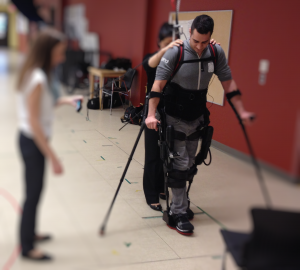Researchers in Drs. Tania Lam and Lynn Stothers’ labs know from previous research that walking with an exoskeleton requires you to use your abdominal and core muscles. This is true for even people with high-thoracic and cervical level spinal cord injuries who have been diagnosed as motor-complete who are supposedly unable to activate muscles below their injury level. However, it remains unknown if this type of training can translate to improved seated balance after a spinal cord injury. Furthermore, your abdominal and core muscles co-activate with your pelvic floor muscles (PFM). These muscles are in your pelvis play an important role in bladder function by facilitating the retention and voiding of urine. Training these muscles is known to improve bladder health in other populations. As such, we want to know if using an exoskeleton actives these muscles and in turn translates into better bladder control.
What will happen if you participate?
In this study, we’ll randomize you to training in one of our two exoskeletons: the Lokomat or the Ekso. After 2 weeks of baseline testing, we’ll ask you to come into the lab three times per week for three months to complete your training with the exoskeleton. During these months, we’ll focus on improving your speed, efficiency, and independence with the machine. At the end of the three month period, we will do some final assessments to see if there were improvements in your seated balance and your bladder health.
You can choose to participate in Part 1 and/or Part 2 of this study.
Why you might want to participate in this study:
Participating in this study will provide you with the opportunity to use exciting robotic technology such as the Lokomat and Ekso. You might also learn more about your seated balance ability and your postural control with respect to your trunk. We hope that the results from this study may go on to inform therapists and other rehabilitation professionals about how best to train seated balance and other functional abilities.

If you are an adult with SCI, you may be able to participate in this study if:
- you are 19-65 years old
- you have had an SCI at least 6 months ago above T6
- you have bladder dysfunction symptoms as a result of you SCI (e.g. frequent catheter use, urine leakage, problematic AD)
- you have enough strength in your arms (motor-complete below C7 or motor-incomplete with good upper limb strength)
- you use independent sitting as part of your typical daily activities
- you are able to tolerate an upright posture for 30 minutes (with or without breaks)
- you are in good general health
If you are an able-bodied adult you may be able to participate in this study if:
- you are 19-65 years old
- you are in good general health and able to stand without difficulty
You should not participate in this study if any of the following applies to you:
- you are under 19 years of age or over 65 years of age
- you were not able to walk before you had your injury
- you have another neurological condition that affects your ability to move
- you have a medical condition that prevents you from exercising (e.g. heart problem, muscle pain, broken or weak bones)
- you have poor range of motion in the legs that prevent you from using the Ekso or Lokomat
- you are not within the capacity limits of the robotic exoskeletons (height 5’2” – 6’2” and weight less than 220lbs)
- you are pregnant
- you are unable to provide consent and/or follow instructions
Time required for participation: approximately 65 hours over 3.5 months.
Compensation for participation: Participants will be provided with an honorarium of $100 for completing the pre- and post-assessments, plus an additional $50 for each bladder assessment completed (up to 2 bladder assessments).
This study will take place at ICORD.
For more information or to sign up to participate, please contact the study coordinator, Alison Williams by email or call 604-675-8814

